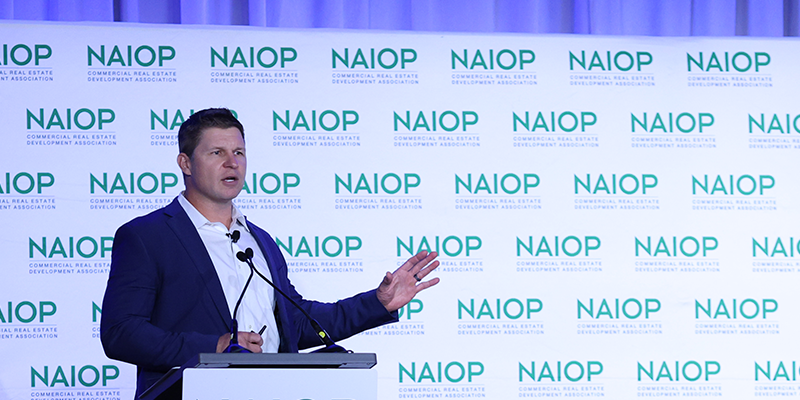No topic is more talked about in boardrooms of real estate investment trusts (REITs) across the country right now than ESG – the trending acronym for Environmental, Social and Corporate Governance factors that measure the sustainability and societal impact of an investment in a company or business – said a panel of speakers at the Real Estate Executive Council (REEC) 2021 Spring Virtual Conference. NAIOP is a founding member of REEC’s Diversity Partners Program.
Environmental factors are increasingly important to investors, said Susan Swanezy, partner with Hodes Weill & Associates and board member of AvalonBay Communities Inc. Swanezy identified how various environmental considerations must be evaluated. In property acquisitions, should rising sea levels be examined? For developers, are the standards of a sustainable property being met? In operations, are state-of-the-art systems being used? For portfolio management, are there ongoing climate risks? Does a property have proper resiliency strategies in place? Is there appropriate insurance?
All these pieces come together in decision-making, said Swanezy, noting that AvalonBay has science-based corporate responsibility goals that they make publicly available.
Kenneth Bacon, chairman of the board for Welltower, noted one measurement of environmental responsibility are “green bonds,” defined by PwC as a mechanism to raise funds for new and existing projects that deliver environmental benefits and a more sustainable economy.
Social factors, or how a company runs its relationships with its workforce, surrounding community and political environment, center on the people of the organization, said Chris Lee, partner and head of real estate Americas, KKR. Much of a company’s potential is based on how its workforce operates, risks that must be managed, and how future demographic or consumer challenges could change the demand for a product or service.
Governance can be the least exciting topics to discuss, says Bacon, but are crucially important because they are the mechanics of how a company operates, manages its board, and works with investors. Publicly traded companies must meet New York Stock Exchange Corporate Governance Guidelines, including how a board functions, who comprises it in terms of diversity, equity and inclusion, and how terms and appointments are handled. “Investors want to know what the company is doing and how it’s operating, sometimes more so than financial returns,” said Bacon.
ESG can – and should – affect executive compensation, the panelists agreed. But these goals can take time, and there’s not a long track record for establishing targets. Bacon’s advice: Just do it. “Diversity goals are hard, and you can spend a lot of time trying to set goals versus just doing it.” These goals are already part of compensation packages in Europe, where many boards have set seats for women. Bacon says he expects most management will be evaluated on ESG within two years. “When the big investors are saying they want to see how these goals are being met, it’s going to become more prevalent,” he said.
Beyond ESG, the panel tackled other conversations taking place across REIT boardrooms, including succession planning. Swanezy said that when AvalonBay’s CEO announced his retirement timeline, the plans he had laid in place several years beforehand were key. The company looked at internal candidates but ultimately hired someone from the outside, bringing the individual in early this year as president and exposing him to the role of CEO, for which he’ll eventually assume responsibility. Swanezy said it’s important to have such a plan in place, taking important time and making sure internal candidates are given ample opportunity to develop new skills that might help them transition upwards – as well as the important acknowledgement of their critical role on the team if they aren’t selected for the position. “Forward planning and thinking ahead about different layers are critical to success,” she said.
Acting on social issues that arise unexpectedly have dominated recent boardroom conversations. Bacon noted the aftermath of the George Floyd murder and ongoing state issues surrounding voting. “Corporations have to react quickly, and there not always time for a board to do conduct studies and do presentations,” he said. Bacon said action isn’t always in the form of an official company statement. “Do something of substance, like give people time off from work to vote,” he said.
Employees aren’t shying away from talking about these issues, agreed the panelists. They want to know how management feels about social issues, and how the company is responding to them.
Mental health has risen as a hot topic during the pandemic, said Lee. The risk of burnout as people have faced a challenging convergence of work and home lives, often exacerbated by pressures of childcare or schooling from home, is a major concern. Younger employees found themselves either isolated alone at home or back on mom and dad’s couch – suffering a huge loss of community. Boards are having serious conversations about taking care of employees and urging them to disconnect and take needed breaks, and leadership teams need to set the example. “We can’t work another 15 straight months the way we’ve been working,” said Lee.
The ultimate return to the office after a prolonged period of working from home is causing uncertainty among both employees and corporate boards, who are wrestling with re-entry plans, vaccine requirements and an entire new slate of related topics that have crept into boardroom conversations. With a new “work from anywhere” mindset, Bacon says concerns about company culture and the ability to manage remote teams are emerging, as well as the issue of fairness for both women and minorities. “Out of sight is out of mind, and being out of mind can cost you a rise up the corporate ladder,” he warned young professionals listening to the panel discussion. “Interaction is important, and CEOs are going to want to see their teams.”
Swanezy said that while the pandemic has proven that working remotely can be effective, she agrees that face time with the boss is important in the competitive element of the workplace. Hybrid schedules will likely be the most popular outcome, but she expects employees to be back in the office at least three days per week as the pandemic subsides.








